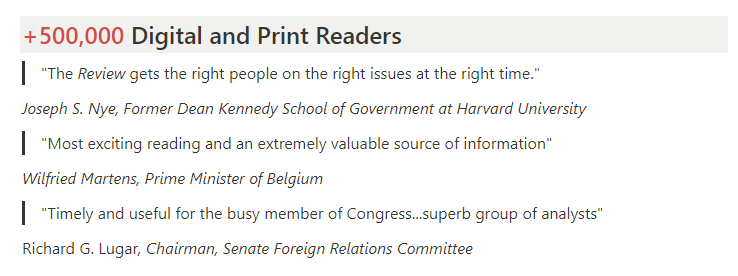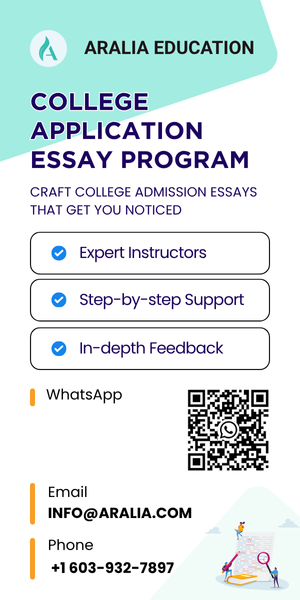Stand out in the college admission process
1. What is Harvard International Review?
Founded in 1979, Harvard International Review (HIR) is a quarterly magazine on international affairs by a journalist organization of Harvard University students. The editorial team includes Harvard students, faculty, and experts in the field. HIR’s journal articles are written from the perspective of scholars, leaders, and policymakers, and “each issue has exclusive interviews and editorials.” Looking at HIR over the past 45 years it’s been in publication, the prestigious, notable magazine has featured 43 Presidents and Prime Ministers, 4 Secretaries-General, 4 Nobel Economics Prize laureates, and 7 Nobel Peace Prize laureates.
Is Harvard International Review peer-reviewed?
No, but HIR is still an excellent, well-written international news source for over 500,000 readers worldwide. Read more about HIR History to understand Harvard International Review’s credibility, including a list of renowned world leaders who have contributed to the journal.
2. What is Harvard International Review Academic Writing Contest?
Among its impressive reader base of prominent world leaders, HIR also has a lot of high school readers. Hence, since its initiation in 2020, Harvard International Review hosts an HIR Academic Writing Contest (HIR AWC) for high schoolers interested in international affairs. Students compete by writing short-form articles just like those published in Harvard International Review. The goal of HIR AWC is to “encourage and highlight outstanding high school writing on… international affairs.” Each school year, the contest features 3 rounds: Fall/Winter, Spring, and Summer, and topics/prompts are provided for each round.
3. Why should I participate in the HIR AWC?
The process of conducting detailed research in an area of unique interest to you—as well as reading through the international affairs journals that world leaders regularly refer to—will make you a well-informed global citizen who’s in tune with the level of academic writing acceptable in the world of international relations news. Participating in HIR AWC will allow you to become involved in and passionate about a certain world issue and give you the space to develop your own opinions and perspective on how to implement change.
Upon winning, you’re given an impressive platform to express your voice and a significant boost for your college applications. HIR Defense Day sets you up well for public speaking, debate, pitching yourself in future job interviews, and to professors for collaborating in their research labs.
With HIR AWC, you get a taste of what it’s like to be a journalist or an international relations major. At Defense Day, you can virtually meet many well-educated people, broaden your perspective on pressing world issues you might not have heard of before, and learn from experts’ critical thinking skills. Additionally, you can build your own network—connect with your fellow Defense Day finalists!
Finally, participating in HIR AWC also gets you an incredible chance to get your writing graded professionally by the HIR judges. All student submissions receive a grade. Even if you don’t become a Finalist or win any awards, you’ll still get a grade, which can be very helpful in your academic progress and advancement! How often do students receive constructive feedback from educators and experts outside their high school faculty?
4. How do I participate in HIR Academic Writing Contest?
Eligibility: High school students (9-12th grade) of all nationalities in any American high school (as well as American citizens studying abroad) are eligible to participate in the HIR Academic Writing Contest. High school students outside the US can also participate, but submissions must be written in English with standard American spelling. All students must register by the deadline to participate in the competition. Do not simply write and try to submit your article.
Important HIR AWC registration dates:
Spring 2025
Registration: Registration is on a rolling basis and is maxed out for this season. Since each essay is read thoroughly and graded on an extensive evaluation rubric, there is a cap on how many essays HIR can receive.
Submission Deadline: May 31, 2025
HIR Defense Day: June 29, 2025
Summer 2025
Registration: Opens May 2024
Submission Deadline: August 31, 2025
HIR Defense Day: October 5, 2025
Fall/Winter 2025
Registration:
Submission Deadline: January 2, 2026
HIR Defense Day: February 5, 2026
Contest Fee: $40
Unlock Your Writing Potential: Students in Our Writing Competition Preparation Class Are More Likely to Secure Awards
5. What is Harvard International Review Defense Day?
With each contest season, selected Finalists are invited to a virtual HIR Defense Day. These impressive student Finalists each give a 15-minute presentation and oral defense of their article in front of judges from Harvard International Review. Finalists are eligible to compete for Gold, Silver, or bronze medals.
What is an oral defense?
Students will present their research and distinctive perspectives on the global issue at hand in their article and state their proposal for change. Oral defenses are common for students pursuing PhD programs. PhD candidates present their preliminary data, defend the importance of their thesis/dissertation, and request approval on their research plan for the remainder of their PhD years to a board of professors. Similarly, HIR Defense Day is also an excellent opportunity for students to taste what it’s like to confidently pitch their ideas in front of a board of business executives!
6. What awards do students get from Harvard International Review Academic Writing Contests?
Students who are selected to become Finalists for Defense Day compete for the Gold, Silver, and Bronze medals. Students who don’t qualify for Defense Day but receive a high enough score can receive an HIR certificate for either the Commendation Prize, Outstanding Prize, or High Commendation Prize. See below for example certificates.


Finalists who win medals also receive certificates along with name recognition on the HIR website. Students whose essays received a Gold Medal are in the global top 3% of HIR academic writing contest. Silver: global top 10%. Bronze: global top 20%
Additionally, every submission gets a certificate of completion. We’ll cover all the details of how the scoring system works later on in the blog.
7. What is the format for a HIR Academic Writing Contest submission?
Your article must be between 800 to 1,200 words (excluding figures, data tables, or authorship statements). This is a strict limit, so remember: quality over quantity. Your article will get a better grade if you can write it just as clearly in 800 versus in 1,200. Read more about the HIR AWC Submission Guidelines.
Carefully read the HIR AWC Submission Guide, specifically for the latest Spring 2024 contest. This guide outlines the writing style HIR wants students to follow with their submissions, along with a wide-ranging comprehensive list of stellar sample articles to give you an idea of how to write and critically analyze the topics.
For 2025 competition, students have 3 themes to choose a topic from:
Global Commons and Stewardship of Shared Resources
Emerging Powers in a Changing Global Order
Resilient Cities and Urban Futures
List of categories to examine the topic from:
- Agriculture
- Cybersecurity
- Defense
- Education
- Employment & Immigration
- Energy & Environment
- Business, Finance & Economics
- Public Health
- Science & Technology (include Space)
- Trade
- Transportation
- Law & Diplomacy
8. How do I pick a topic?
Below are some starting points to help you pick a topic:
- Read through the latest articles on HIR to see what the magazine is interested in publishing now.
- Read most contest winners from the latest season to assess their writing style.
- Consult with an expert instructor from Aralia to help students win this HIR contest.
- Get the news app for CNN, NYT, and Washington Post, as well as smaller, more niche news outlets, etc., on your phone to get a daily digest or easily browse headlines while you’re on the subway, waiting in line for a coffee, etc.
- Sign up for email newsletters to get a weekly rundown of the current state of world affairs.
- Visit your school library to get assistance with access to the latest trending topics in research journals.
- Pick a country you’re interested in, Google them, and click the “News” tab. Try out some less famous countries.
Please note that it may be a good idea to look for “under-appreciated global issues.” HIR isn’t looking for you to write another article of the countless ones out there on the most popular global issues. If there is a popular world issue you’re particularly passionate about, try going at it from a niche angle. Dive deep into the available research and note what areas are less mentioned. Is there a new breakthrough in scientific research that’s only beginning to gain traction but has the potential to improve the quality of life of people on a global level? Is a specific population outside of the West affected disproportionately by a certain issue? Is there a country calling for international assistance that is left behind by the UN and other cross-national alliances, or is it in the spotlight of media outlets? What can you bring awareness to? How can your article actually make a tangible impact by bringing a hidden yet important issue to light on a platform as wide-reaching and well-respected as Harvard International Review?
Once you’ve jotted down a few topics and before you start writing your essay, refer to the grading rubric to make sure you’re on the right track. We’ve summarized the most important aspects of the grading rubric in this blog—stay tuned below!
9. How do I write a good article?
First and foremost, write from a global perspective—do not just focus on the U.S.! HIR wants an “analytically backed perspective on an under-appreciated global issue.” Have a well-researched, insightful thesis, but don’t write a persuasive piece. You cannot submit an op-ed, editorial, or opinion piece to the journal.
A second tip is to really really do your research. These articles aren’t quick to write! One High Commendation Award student shared they spent one month researching and writing their essay.
Next, don’t just write a flat, analytical article like a typical research paper—write about a world issue you’re deeply passionate about and have an idea for change. Have a unique thesis/point/message/purpose/objective. Don’t just state, “this is the world issue.” Write about what you think can be done about it. Read about HIR AWC Gold Medalist Heidi Pan and her passion for bringing awareness to an overlooked environmental issue. You can also read Heidi’s Gold Medal paper.
Lastly, add an image after every 3-4 paragraphs for decoration and visual aid. Pick the best, most representative image for your header to accompany your article title. If relevant to and necessary for your topic, include a simple, reader-friendly graph or chart for data visualization. It may be beneficial to your article to illustrate a rising/falling trend, or to display change over time. However, as you will notice when reading other sample articles, many don’t include a graph, so this is not expected.
Harvard International Review Academic Writing Contest Winners
Read articles by previous Harvard International Review Academic Writing Contest winners!
- HIR AWC Spring 2023 Medal Winners
- HIR AWC Fall/Winter 2022 Medal Winners
- HIR AWC Summer 2022 Medal Winners
- HIR AWC Spring 2022 Medal Winners
The best way to write a good article for the HIR Essay Contest is with mentorship from experienced teachers. Try Aralia’s HIR Contest Preparation Class, which has historically led students to multiple victories. In the 2022 Winter round of HIR AWC, students who took Aralia’s HIR class won 2 Gold medals, 2 Silver medals, 1 Bronze medal, 11 High Commendations, and 4 Outstanding Writing Style prizes! Read more about how Aralia’s students won the HIR Essay Contest to see how Aralia Education can elevate your global affairs journalism skills. Our team of passionate, dedicated, award-winning educators is beyond excited to help you maximize your potential as a student.
10. How do I do research and cite?
Your HIR Academic Writing Contest article should be thoroughly researched, and all citations should be in hyperlinks. Do not include a bibliography.
How do I cite with hyperlinks?
This is an example of a hyperlink when one word or a short phrase is linked to the relevant article (in this case, the source of the information you’re writing about). You should hyperlink either a single word or a very short phrase. Anytime you pull in a fact you researched (i.e., event/news, case study, individual’s story, historical fact, current public sentiment, people’s quotes, etc.), you should cite it with a hyperlink. See this example:
“Economic and political opportunity ultimately drive many trained individuals to emigrate, contributing to brain drain on a massive scale.” Africa’s Growing Scientific Communities: A New Renaissance
How many sources should I cite per article?
The articles on HIR range anywhere between 6 to around 20; our recommendation is to aim for 10 reliable sources and don’t overwhelmingly cite any single source. You must cite in the Associated Press (AP) style, as this citation style is most common for news writing.
What’s a reliable source?
From other high-quality HIR articles, we’ve compiled a list of good sources for you to cite research from: CNN, History.com, Washington Post, Business Insider, TIME Magazine, CDC, WorldData.info, Marie Carie (on global issues), NewHumanitarian, World Bank, CNBC, ScienceDirect, and London School of Economics and Political Science blogs. These are just a couple of starting points.
What types of sources should I collect research from?
A hallmark of an excellent HIR essay is in-depth, comprehensive research. You can cite research from news articles, research studies, historical articles/essays, and even video documentaries (from credible accounts) on YouTube.
You can cite the same article multiple times, but ensure you have many sources if you repeat a citation. Do not cite one source 5 times and only have a couple of other sources. You cannot cite ChatGPT and other similar tools.
Other rules
Using Artificial Intelligence (AI) tools, such as ChatGPT, is strictly prohibited. Consider working with an Aralia tutor if you want editing support and peer review. More information on Aralia Education’s HIR Contest Class.
11. How is it graded?
All article submissions receive a grade between 0 to 55 points. There are 11 criteria with where you can earn up to 5 points in each.
What it takes to get 5/5 points in each Content section
Topic | Introduction | Structure/Transitions |
Topic is underappreciated in mainstream media, highly relevant to international affairs, and clearly connects back to the theme | Introduction pulls the reader in with a “hook” and effectively sets up the author’s argument | The submission employs topic sentences that are concise and appropriate; transitions between paragraphs are smooth and natural. The submission has a clear logical flow of ideas that guides the reader through the premise. |
Use of Evidence | Analysis of Evidence | Overall Coherence of Argument |
The author consistently provides evidence that is highly relevant and compelling | The author consistently employs analysis that draws logical conclusions from the evidence they provide; the author’s analysis is creative and brings the evidence “to life.” The analysis mirrors that of a journalist, analyst, or academic. | The argument mirrors that of a sophisticated analyst or academic |
What it takes to get 5/5 points in each Style section:
Tone | Spelling, Punctuation, and Grammar | Adherence to the HIR Style Guide |
The tone is consistent with previously published HIR articles | There are 0-2 mistakes related to spelling, punctuation, and grammar | There is perfect or near perfect adherence to the HIR style guide |
Citations | Overall Ease of Reading |
|
All factual claims are backed by a citation from a reliable source; all ideas that are not the author’s are properly attributed. Citations are made via hyperlinks. | The submission is easy to read and is near the writing level of an HIR article |
Read more information in the HIR AWC HIR Evaluation Rubric.
Refer to the Submission Guide for contest-specific instructions on using acronyms, capitalization, citations and sourcing, foreign expressions, symbols and numbers, titles and names, pronouns, cultural sensitivity, place names, and more.
Skim through this HIR Master Style Guide (refer to the table of contents/document summary on the left-hand side for easy navigation). This guide is for articles published in the HIR journal, not for the academic writing contest. However, it is still valuable since the contest wants students to imitate the writing style of actual, published HIR articles.
If HIR AWC appeals to you, it’s also a great gateway for you to get into Speech & Debate! If this part in particular stands out to you, consider participating in the most prestigious Speech & Debate competition in the nation: NSDA Nationals.
Aralia's Courses

HIR Academic Writing Contest Prep
In the HIR Academic Writing Contest Preparation, students will explore college-level topics in international affairs to craft a compelling, well-researched essay.












